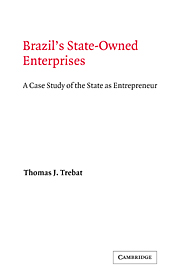Book contents
- Frontmatter
- Contents
- List of tables and figures
- Preface
- 1 Introduction
- 2 The economic role of the state
- 3 Origins of public enterprise in Brazil
- 4 The control of public enterprise in Brazil
- 5 Relationships with economic growth
- 6 Sources of growth and rates of return
- 7 Policies on pricing
- 8 The financing of public enterprise investment
- 9 Conclusions
- Appendix A Enterprises included and years covered
- Appendix B Sources and interpretation of data on public enterprises, 1965–1979
- Notes
- Selected bibliography
- Index
- Cambridge Latin American Studies
- Frontmatter
- Contents
- List of tables and figures
- Preface
- 1 Introduction
- 2 The economic role of the state
- 3 Origins of public enterprise in Brazil
- 4 The control of public enterprise in Brazil
- 5 Relationships with economic growth
- 6 Sources of growth and rates of return
- 7 Policies on pricing
- 8 The financing of public enterprise investment
- 9 Conclusions
- Appendix A Enterprises included and years covered
- Appendix B Sources and interpretation of data on public enterprises, 1965–1979
- Notes
- Selected bibliography
- Index
- Cambridge Latin American Studies
Summary
The Brazilian experience with public enterprise has been reviewed from a number of different viewpoints. The task has required the gathering and interpretation of many facts and figures. This leaves us with the question: “What does it all mean?” I have approached this in three ways. First, the major conclusions on the Brazilian performance itself are assembled and reviewed. Second, the relevance of the Brazilian experience for other developing countries is discussed. Third, in the light of past performance, I consider the future role of public enterprise in Brazil.
The Brazilian experience reviewed
A steadily increasing role for the state in the economy has been a generally “stylized fact” of the post-1930 Brazilian industrialization experience. This growing role can be measured in terms of the two categories of the “state as regulator” (e.g., controls over foreign trade, traditional fiscal functions) and the “state as entrepreneur.” Through the combined impact of its spending, taxing, regulating, banking, and directly productive activities, the Brazilian state exercises an enormous direct and indirect effect on decision making and resource allocation throughout the economy. This role has grown in the absence of any specific socialist ideology and, indeed, has bloomed vigorously under governments, such as those of the post-1964 period, that expressed deep philosophical and practical commitments to retaining this central role of the marketplace as the guide to economic decision making.
To understand why Brazil has embraced the apparent contradictory principles of an activist state and a basically decen- tralized economic system one must understand its underlying concept of the proper role of the state.
- Type
- Chapter
- Information
- Brazil's State-Owned EnterprisesA Case Study of the State as Entrepreneur, pp. 234 - 245Publisher: Cambridge University PressPrint publication year: 1983



